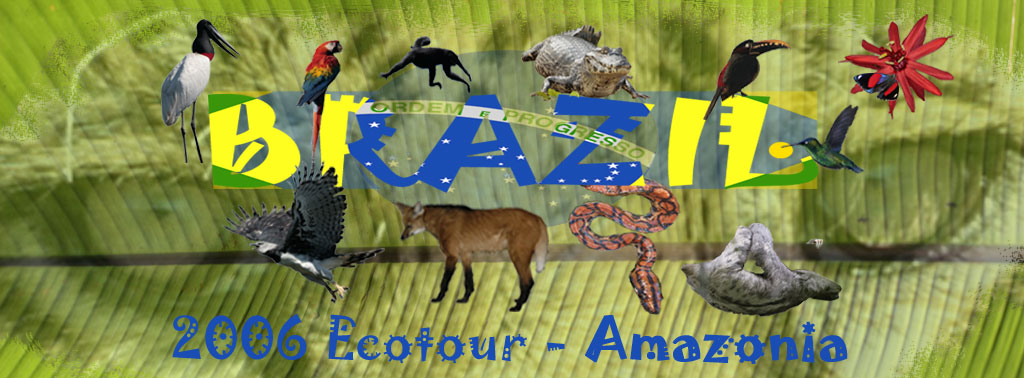



Added 3 September 2006
Day 12: Saturday, June 17, 2006
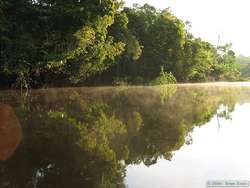
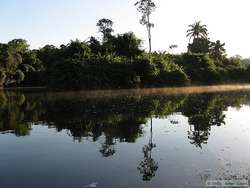 In the morning, we took a boat up river to the Brazil Nut Trail. We didn't see much on the river, but it was a beautiful morning with a light mist over the water.
In the morning, we took a boat up river to the Brazil Nut Trail. We didn't see much on the river, but it was a beautiful morning with a light mist over the water.
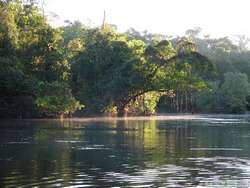
|
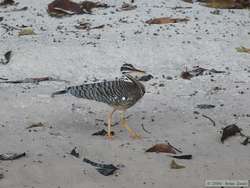
|
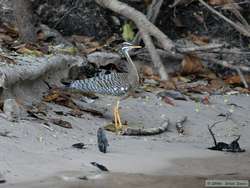
|
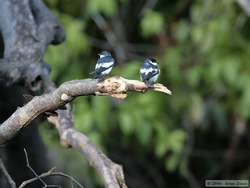
|

|
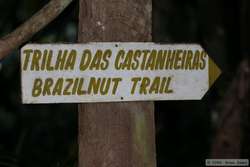 Once on the Brazilnut Trail, we didn't see anything we could get a good enough look at to identify on the trail except for a musician wren. The musician wren looks unassuming, but it has an amazingly beautiful song. Click on the link below to hear a wav file of the musician wren's song.
Once on the Brazilnut Trail, we didn't see anything we could get a good enough look at to identify on the trail except for a musician wren. The musician wren looks unassuming, but it has an amazingly beautiful song. Click on the link below to hear a wav file of the musician wren's song.
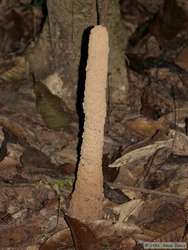 Once again, with no wildlife to view, I turned my attention towards the plants and other sights. We saw a number of cicada burrows. When the cicada goes into the dormant portion of it's long life cycle. Cicadas may emerge only once every 17 years, though sometimes the life cycle is shorter. We were told that the depth to which the cicadas burrow is directly related to the length of the life cycle, so the longer the cycle, the deeper it burrows. I don't know what the purpose of the above ground portion is, but perhaps it is protection from water flooding down into the burrow. Purely a guess there though, so don't quote me on that.
Once again, with no wildlife to view, I turned my attention towards the plants and other sights. We saw a number of cicada burrows. When the cicada goes into the dormant portion of it's long life cycle. Cicadas may emerge only once every 17 years, though sometimes the life cycle is shorter. We were told that the depth to which the cicadas burrow is directly related to the length of the life cycle, so the longer the cycle, the deeper it burrows. I don't know what the purpose of the above ground portion is, but perhaps it is protection from water flooding down into the burrow. Purely a guess there though, so don't quote me on that.
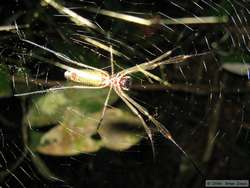
|
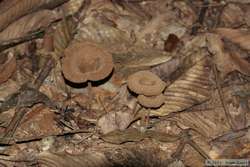
|
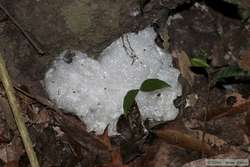
|
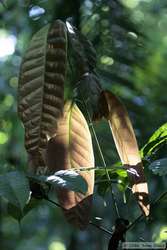
|
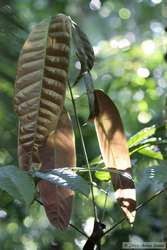
|
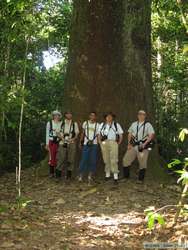
|
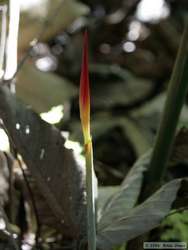
|
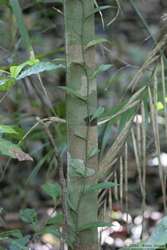
|
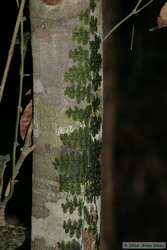
|
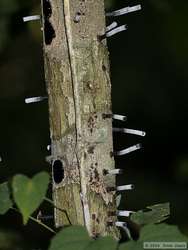
|
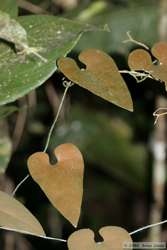
|
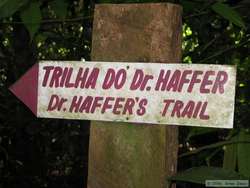
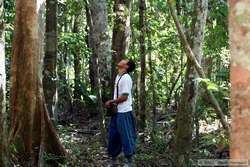 After the Brazil Nut Trail, we went by boat down stream and across the river to the Dr. Haffer Trail, which parallels the river.
After the Brazil Nut Trail, we went by boat down stream and across the river to the Dr. Haffer Trail, which parallels the river. 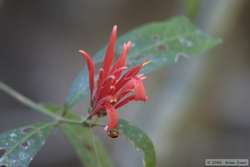 The boat driver continued down river and picked us up at the other end. On this trail too, we didn't see much in the way of wildlife, and what we saw we only saw briefly. One very notable exception was the sighting of a couple of bay-headed tanagers (Tangara gyrola), which look like a painter's palette. We also saw some interesting butterflies and other insects.
The boat driver continued down river and picked us up at the other end. On this trail too, we didn't see much in the way of wildlife, and what we saw we only saw briefly. One very notable exception was the sighting of a couple of bay-headed tanagers (Tangara gyrola), which look like a painter's palette. We also saw some interesting butterflies and other insects.
We tried hard to see a mot-mot that we heard but were unable to find.
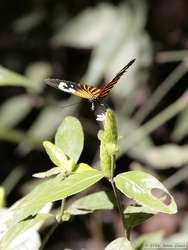
|
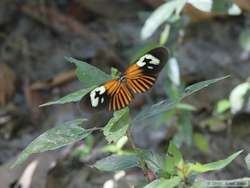
|
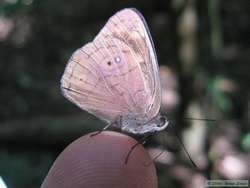
|
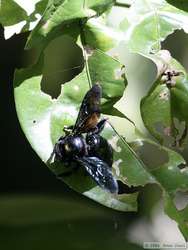
|
When we got back to the lodge, we saw some white-whiskered spider monkeys (Ateles marginatus), which we stopped to take some pictures of.
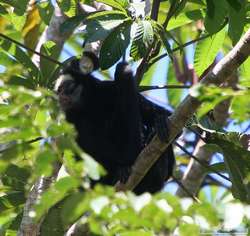
|

|
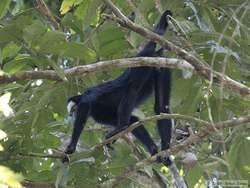
|

|
I decided to go down to the dock after lunch again. As we were headed back to our bungalows after lunch we saw some more white-whiskered spider monkeys so took some more pictures.
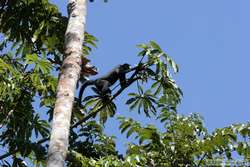
|
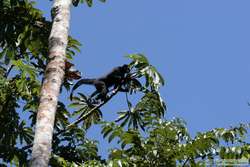
|
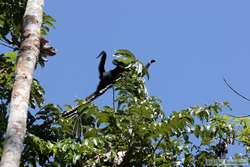
|
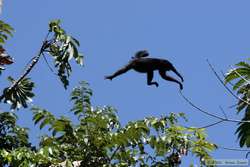
|
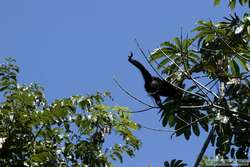
|
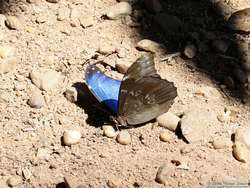
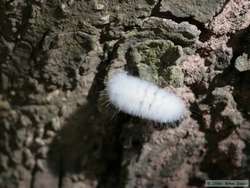 After that, Shan wanted to take a nap, so I went down to the floating platform by myself again to write and enjoy the river. I saw the juvenile great black-hawk (Buteogallus urubitinga) again, and this time was better prepared with my binos and camera. I also saw a swarm of beautiful butterflies, or borboletas in Portuguese. There were primarily three species of butterflies, one brown and two were different shades of yellow. The butterflies that were a lighter shade of yellow were some kind of sulphur butterfly. There were hundreds and hundreds of them.
After that, Shan wanted to take a nap, so I went down to the floating platform by myself again to write and enjoy the river. I saw the juvenile great black-hawk (Buteogallus urubitinga) again, and this time was better prepared with my binos and camera. I also saw a swarm of beautiful butterflies, or borboletas in Portuguese. There were primarily three species of butterflies, one brown and two were different shades of yellow. The butterflies that were a lighter shade of yellow were some kind of sulphur butterfly. There were hundreds and hundreds of them.
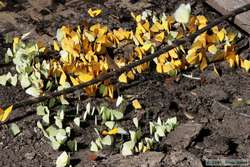
|
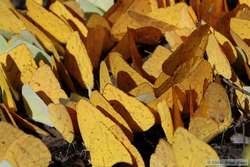
|
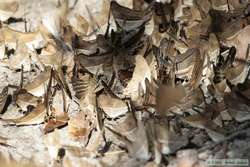
|
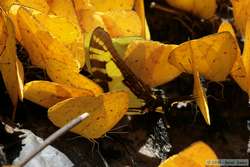
|
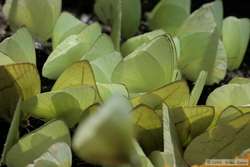
|
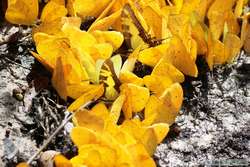
|
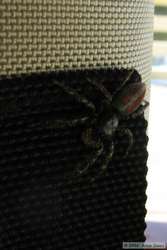
|
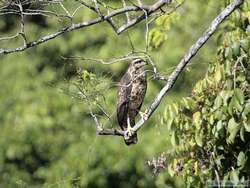
|
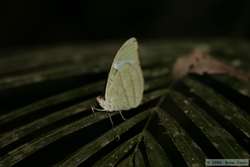 After a while, Shan came down to play a game of Scrabble, but we had barely started when she said she was feeling really tired and that she might not go on our afternoon hike back up to the tower. I ended the game early and marched her back up to the room for a shower to cool her off and put some spring back in her step. It appeared to have worked, because she thanked me later for getting her to go.
After a while, Shan came down to play a game of Scrabble, but we had barely started when she said she was feeling really tired and that she might not go on our afternoon hike back up to the tower. I ended the game early and marched her back up to the room for a shower to cool her off and put some spring back in her step. It appeared to have worked, because she thanked me later for getting her to go. 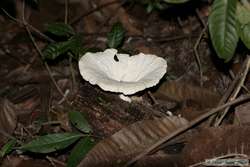 It seemed that the humidity was draining her a bit. I normally hate humidity as well, but I guess the energy of the place helped keep me going.
It seemed that the humidity was draining her a bit. I normally hate humidity as well, but I guess the energy of the place helped keep me going.
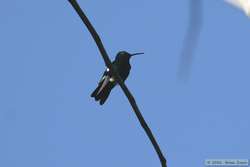
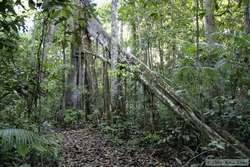 We picked up a handful of new species on the way to the tower, and another handful or so at the tower that evening, including a beautiful toucan. We also saw some old favorites, such as scarlet macaw. We passed a tree with a huge flying buttress. We would see this tree almost every time we went to the tower, but it amazed us each and every time. The end of the buttress is about 50 feet from the base of the tree, and I have no clue how it got that far away. Truly amazing.
We picked up a handful of new species on the way to the tower, and another handful or so at the tower that evening, including a beautiful toucan. We also saw some old favorites, such as scarlet macaw. We passed a tree with a huge flying buttress. We would see this tree almost every time we went to the tower, but it amazed us each and every time. The end of the buttress is about 50 feet from the base of the tree, and I have no clue how it got that far away. Truly amazing.
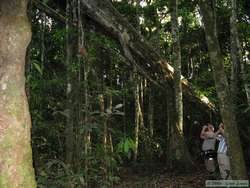
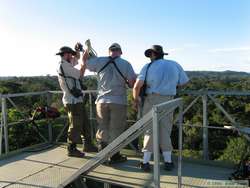 When we got to the tower, Fabricio decided that he was going to raise his tripod to the top using the rope and pulley system on the tower. But when he got to the top and started pulling it up, the rope got all tangled up and he couldn't get the tripod to the top of the tower.
When we got to the tower, Fabricio decided that he was going to raise his tripod to the top using the rope and pulley system on the tower. But when he got to the top and started pulling it up, the rope got all tangled up and he couldn't get the tripod to the top of the tower. 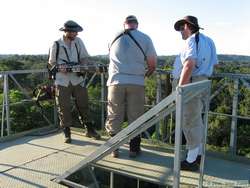 To make a long story short, it took Fabricio three times longer and four times more work to get the tripod up the tower than if he had just carried it. While all of that was going on, I used my spotting scope for the first time on this trip. It ended up being nice to have two scopes at the tower, but I largely took it and used it because I had lugged the thing about 8000 miles at that point, and figured I should use it at least once.
To make a long story short, it took Fabricio three times longer and four times more work to get the tripod up the tower than if he had just carried it. While all of that was going on, I used my spotting scope for the first time on this trip. It ended up being nice to have two scopes at the tower, but I largely took it and used it because I had lugged the thing about 8000 miles at that point, and figured I should use it at least once.
In retrospect, I should have left the spotting scope at home. Between my binos and my camera, I had plenty of gear to deal with, and though I've got a good setup for carrying all three, it's almost too much to deal with. If we'd been in a larger group, the second scope would have been a godsend, but with only the four of us, one spotting scope seemed sufficient in most situations.
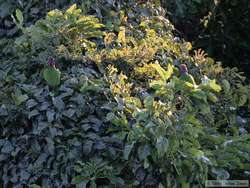
|
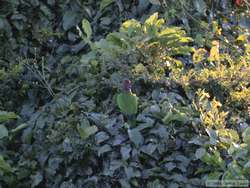
|

|
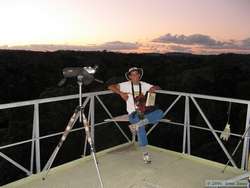
|
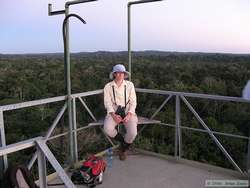
|
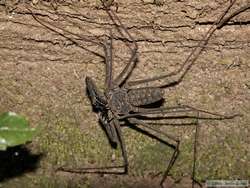
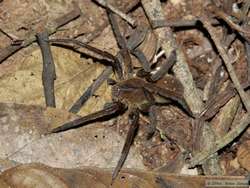 We descended the tower after sunset, and hiked back in the dark, which was neat. I lagged behind and used my flashlight to locate a number of spiders by their eye shine, and took some pictures. I was able to find some pretty cool spiders.
We descended the tower after sunset, and hiked back in the dark, which was neat. I lagged behind and used my flashlight to locate a number of spiders by their eye shine, and took some pictures. I was able to find some pretty cool spiders.
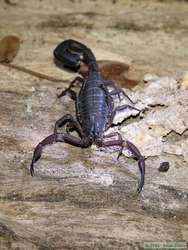
|
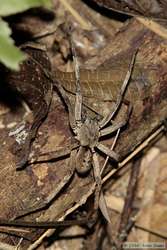
|
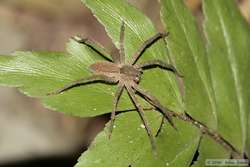
|
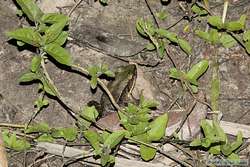 Back at the lodge, all of us minus Fabricio decided to go down to the dock and look for frogs. We finally got to see some herps! We saw two different species of frog and a snake. One of the frogs was green and I'm pretty sure it was an Amazon jungle frog (Rana palmipes). We found what I'm pretty sure is a Flat-headed Bromeliad Tree Frog (Osteocephalus planiceps) on the floating platform. Though the jungle frog was skittish, the tree frog didn't seem to mind our presence at all, and let us get quite close to get some pictures.
Back at the lodge, all of us minus Fabricio decided to go down to the dock and look for frogs. We finally got to see some herps! We saw two different species of frog and a snake. One of the frogs was green and I'm pretty sure it was an Amazon jungle frog (Rana palmipes). We found what I'm pretty sure is a Flat-headed Bromeliad Tree Frog (Osteocephalus planiceps) on the floating platform. Though the jungle frog was skittish, the tree frog didn't seem to mind our presence at all, and let us get quite close to get some pictures.
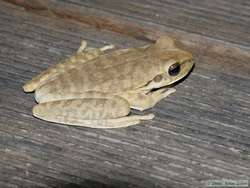
|
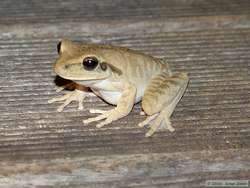
|
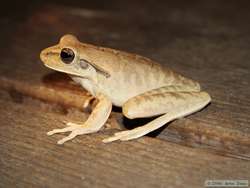
|
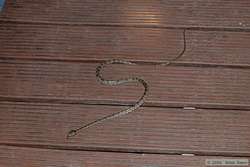 Wil, who appears to be a volunteer guide (or volunteer something) at the lodge, identified the snake as an amazon tree boa (Corallus hortulanus). Research after returning home was inconclusive, though the "halloween phase" of the amazon tree boa is very similar to what we saw.
Wil, who appears to be a volunteer guide (or volunteer something) at the lodge, identified the snake as an amazon tree boa (Corallus hortulanus). Research after returning home was inconclusive, though the "halloween phase" of the amazon tree boa is very similar to what we saw. 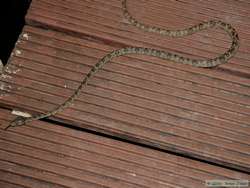 The snake appeared on the floating walkway out to the platform. We were all returning to our rooms, and I was last in line. After the others had passed a particular spot, the snake popped up from between the slats and started racing across the walkway. I yelled to the others who raced back just as it was about to slither off the platform into the water. Wanting the others to get a chance to see the snake, I grabbed it's tail to pull it back onto the walkway. Chuck yelled out not to grab it but I already knew that, and had a plan in mind.
The snake appeared on the floating walkway out to the platform. We were all returning to our rooms, and I was last in line. After the others had passed a particular spot, the snake popped up from between the slats and started racing across the walkway. I yelled to the others who raced back just as it was about to slither off the platform into the water. Wanting the others to get a chance to see the snake, I grabbed it's tail to pull it back onto the walkway. Chuck yelled out not to grab it but I already knew that, and had a plan in mind. 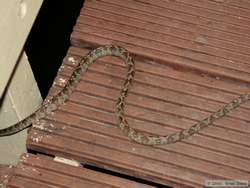 I grabbed it only long enough to get it back on the platform. When I grabbed it, it turned and struck to defend itself but I'd already let go by then, so it quickly turned and continued on it's way and disappeared into the water. It gave everyone an extra second or two to see the snake though. When we went in for dinner, Wil told us he'd caught a cat-eye snake (Leptodeira annulatus)and a rainbow boa (Epicrates cenchria cenchria). The rainbow boa in particular was beautiful.
I grabbed it only long enough to get it back on the platform. When I grabbed it, it turned and struck to defend itself but I'd already let go by then, so it quickly turned and continued on it's way and disappeared into the water. It gave everyone an extra second or two to see the snake though. When we went in for dinner, Wil told us he'd caught a cat-eye snake (Leptodeira annulatus)and a rainbow boa (Epicrates cenchria cenchria). The rainbow boa in particular was beautiful.
Species list for the day (39 birds, 2 mammals, 5 reptiles, 4 amphibians):
Anhinga (Anhinga anhinga)
Snowy Egret (Egretta thula)
Capped Heron (Pilherodius pileatus)
Rufescent Tiger-Heron (Tigrisoma lineatum)
Red-throated Caracara (Daptrius americanus)
Razor-billed Curassow (Mitu tuberosa)
Bat Falcon (Falco rufigularis)
Great Black-Hawk (Buteogallus urubitinga)
Sunbittern (Eurypyga helias)
E Dark-winged Trumpeter (Psophia viridis)
Scarlet Macaw (Ara macao)
Red-and-green Macaw (Ara chloropterus)
Mealy Parrot (Amazona farinosa)
Red-fan Parrot (Deroptyus accipitrinus)
Black-throated Mango (Anthracothorax nigricollis)
Amethyst Woodstar (Calliphlox amethystina)
Black-fronted Nunbird (Monasa nigrifrons)
Curl-crested Araçari (Pteroglossus beauharnaesii)
Channel-billed Toucan (Ramphastos vitellinus)
White-barred Piculet (Picumnus cirratus)
Chestnut Woodpecker (Celeus elegans)
Crimson-crested Woodpecker (Campephilus melanoleucos)
Long-billed Woodcreeper (Nasica longirostris)
Buff-throated Woodcreeper (Xiphorhynchus guttatus)
Scale-backed Antbird (Hylophylax poecilonota)
Black-spotted Bare-eye (Phlegopsis nigromaculata)
Screaming Piha (Lipaugus vociferans)
Plum-throated Cotinga (Cotinga maynana)
Bare-necked Fruitcrow (Gymnoderus foetidus)
Campo Suiriri (Suiriri affinis)
Long-tailed Tyrant (Colonia colonus)
Crowned Slaty Flycatcher (Griseotyrannus aurantioatrocristatus)
Masked Tityra (Tityra semifasciata)
White-winged Swallow (Tachycineta albiventer)
White-banded Swallow (Atticora fasciata)
Southern Rough-winged Swallow (Stelgidopteryx ruficollis)
Musician Wren (Cyphorhinus aradus)
Bay-headed Tanager (Tangara gyrola)
Epaulet Oriole (Icterus cayanensis)
Brown Capuchin (Cebus apella robustus )
White-whiskered Spider Monkey (Ateles marginatus)
South American River Turtle (Podocnemis spp. )
Amazon Racerunner aka Green Ameiva (Ameiva ameiva)
Amazonian Tree Boa? (Corallus hortulanus)
Brazilian Rainbow Boa (Epicrates cenchria cenchria)
Cat-eyed Snake (Leptodeira annulatus)
Smooth Jungle Frog? (Leptodactylus diedrus)
Flat-headed Bromeliad Tree Frog? (Osteocephalus planiceps)
Amazon River Frog (Rana palmipes)
Geckos (Family Gekkonidae )
 |
 |